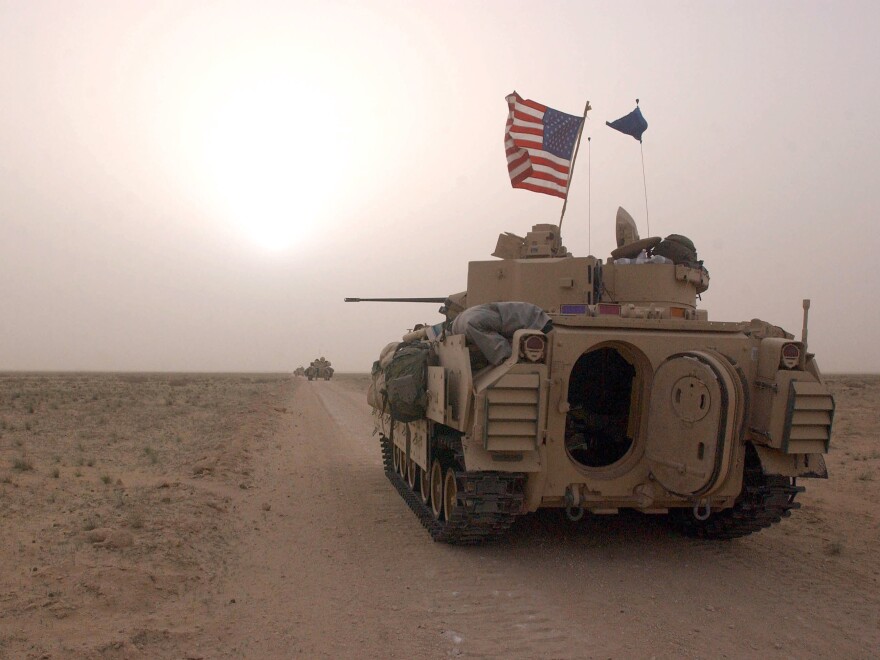If you've heard American veterans celebrating one thing about the PACT Act, which President Joe Biden signed into law Wednesday, it likely has to do with burn pits.
These were massive piles of uniforms, equipment, computers, and other things the U.S. military incinerated to prevent them from falling into the hands of the wrong people.
American veterans, including those who served in Iraq and Afghanistan, will be able to access VA support for a variety of medical problems they likely suffered because of their exposure to burn pits.
But soldiers aren't the only people still struggling with their damaging effects.
Kali Rubaii is an assistant professor of anthropology at Purdue University and studies the toxic legacies of the U.S. war in Iraq.
While the U.S. military has used burn pits in other conflicts, Rubaii said they were exceptionally large in Iraq and Afghanistan.
"Taxpayers funded the U.S. occupation, but the people who were actually spending that money were private contractors and they had no bid contracts," she said. "That means that when a computer or a tank or a uniform was damaged, it was more profitable to actually throw the whole thing into a burn pit, then sell a brand new one to the U.S. military."
While the PACT Act opens new possibilities for American veterans seeking treatment for medical problems they sustained after serving near burn pits, it does not address the harm suffered by civilians living in areas close by.
Rubaii's research has brought her in contact with Iraqis who are struggling with the intergenerational impacts of their exposure.
This interview has been edited for length and clarity.
Interview highlights
On how Iraqis were impacted by burn pits
Veterans saw acute short-term exposure, and they were at peak health. Iraqi people were in all stages of their life course when they were exposed to burn pits, and they were exposed for over 10 years. Even those who live at a distance and downwind face a lot of health effects, and they're varied.
Farmers who live downwind noticed a lot of birth defects and fertility issues with their crops and their livestock. And then children report symptoms of dizziness, balance problems. There have been many cases of brain cancer near and around burn pits.

On possible intergenerational impacts
In a way, burn pits are the least of the violence done to Iraqi people. For example, in 2004, around 70% of Fallujah was leveled. That means no water, no electricity, no hospital, massive injury and death, lots of pollution released into the air. So in Fallujah today, the longstanding effects of that level of bombardment are there is still only a few hours of electricity. My tap water living there is brown. It's undrinkable. The hospitals still lack essential equipment.

So it's in the wake of all of this destruction that doctors at Fallujah Hospital started noticing, around 2004, all of these babies that were born with birth defects. And they started cataloging it, because it just was anecdotally noteworthy that there were more and more. And the tragedy here is that it's unclear what the cause is, but it definitely indicates there's an environmental factor and people notice that the timeline indicates something about U.S. occupation.
On the damage of war when it comes to environment
One of the common problems that people face is that during sandstorms, the air quality is very poor and every single micro particle that can be picked up into the wind is entering people's lungs, lining your teeth, and it's everywhere. And this is a climate change issue. Of course, we have more and more sandstorms and dust storms in Iraq. And the more war detritus that is lying around, the more people are inhaling war. They're inhaling the past of war.

On the families that she has met and the impact that war has had on their lives
I had to watch a child die a few months ago. And she was just this dynamic, inquisitive baby who was born in Fallujah with multiple congenital anomalies. Some of her organs were outside of her body. She had a gap in her heart. She lived for about a week. She made really deep eye contact with everyone, and she was really fighting for her life.
The cause of her birth defects were likely environmental and linked with burn pits, but the cause of her death was the destroyed hospital infrastructure. Had she been in a place where the hospital hadn't been bombed several times, it's possible that she would have survived her birth defects. And I think maybe one of the toughest legacies in Iraq is that environmental damage to people's bodies doesn't have to be fatal if there is also infrastructure to contend with it.
I feel that now that the PACT Act has been passed, it would be up to U.S. health justice organizers to reach out to Iraqi people who are managing incredible burdens and who would be very keen to engage in a joint struggle for extending the kind of reparative care that's available to veterans now to the Iraqi people who've been living in the wake of these burn pits.
Copyright 2022 NPR. To see more, visit https://www.npr.org.






